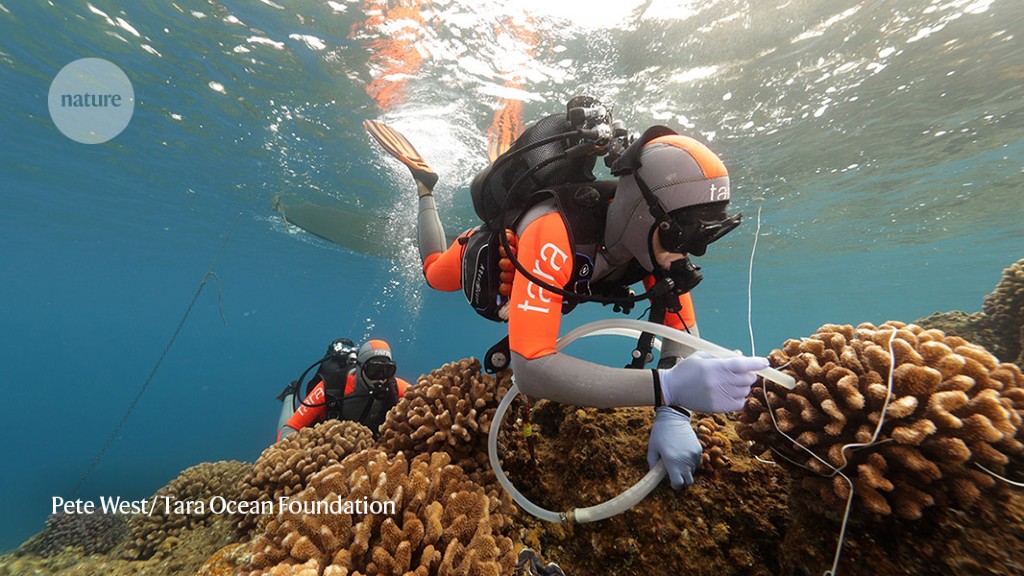Epic voyage finds astonishing microbial diversity among coral reefs

World’s largest survey of Pacific corals clocked 100,000 kilometres, collecting 58,000 samples from 249 locations including Indonesia, Japan and Papua New Guinea

The samples were collected during some 3,000 dives by scientists aboard research vessel Tara.Credit: Pete West/Tara Ocean Foundation
The largest-ever survey of Pacific Ocean corals has found that there’s likely to be more genetic diversity in the world’s coral reefs than researchers previously thought.
This assessment is based on a collection of studies reporting the results of the Tara Pacific expedition, a two-year research voyage of the vessel, Tara, which surveyed the genetic, chemical and microbial diversity of coral reefs. Researchers estimate that more than half of global coral coverage has disappeared over the past 70 years, along with 60% of the associated species diversity.
Marine scientists, microbiologists and crew members together clocked 100,000 kilometres after setting sail from the port of Lorient in France on 28 May 2016. They collected 58,000 samples of water, aerosols, coral, fish and plankton from 249 locations, including in Indonesia, Japan and Papua New Guinea.
In a study published in Nature Communications1, Pierre Galand, a marine microbiologist at Sorbonne University in Paris and his colleagues sequenced a gene commonly used to identify and classify microbes, from some 5,000 samples. It is called the 16S ribosomal DNA marker gene. The team found 542,399 DNA sequences known as amplicon sequence variants (ASVs), which are a measure of the genetic variation of bacteria.
Galand says he was surprised to find half a million sequences in one place. For comparison, according to one existing estimate2, 44,000 ASVs are associated with Indian Ocean corals. “As we kept sampling, we kept seeing more diversity and more bacteria,” Galand says.
The authors say their data from the Pacific represent one-fifth of known estimates for the diversity of all of Earth’s bacterial and archaeal communities (between 2.72–5.44 million ASVs).
The researchers estimate the diversity of reefs globally to be around 2.8 million ASVs. That suggests the known value for the diversity of all of Earth’s microbial communities is also likely to be much greater than the existing estimates, says Serge Planes, a marine ecologist at PSL University in Paris and leader of the consortium.
The scientists say they hope to use the latest results to unpick how that diversity links to reef function and health, including the impacts of climate change and pollution.
Vitamin ‘B for bacteria’
Another study, also in Nature Communications3 explores the genetic and molecular make-up of a kind of bacterium commonly associated with corals. This study aims to understand the benefits that the bacteria might provide, such as helping corals to acquire vitamins and amino acids.
Corentin Hochart, a PhD student also at Sorbonne University, examined three species of Endozoicomonadaceae, a family of bacteria commonly associated with coral, to better understand what roles bacteria have in coral health and functioning.
The researchers sequenced bacterial genetic material in samples of three coral genera, Pocillopora (cauliflower corals), Porites (stony corals) and Millepora (fire corals), collected at 99 reefs across the Pacific Ocean. Their study found that each genus of coral was associated with a distinct species of Endozoicomonadaceae. This suggests that the corals evolved a strong relationship with their bacteria over time and that the bacteria are useful to the corals, says Galand, who was also involved in this study.
The study found that each bacterial species produces a different array of vitamins and amino acids which could have important roles in coral health and immunity.
The researchers also collected data that will allow them to study the links between physiological signs of stress in coral and microbial communities and factors such as water quality and temperature.
“Having answers [to those questions], you will be able to disentangle what climate change and anthropogenic stressors will do to the future of coral reefs,” says Planes.
The 100,000-kilometre voyage took in 249 Pacific Ocean locations including Indonesia, Japan and Papua New Guinea.Credit: Pierre de Parscau/Tara Ocean Foundation
The shipping news
Tara Pacific’s 100,000-km research journey is one of a relatively small number of sea-borne scientific expeditions of this scale and ambition.
Scientists collected samples during some 3,000 dives, with the teams on board rotating every six to eight weeks.
The ship had a laboratory to analyse the physical and chemical parameters of water samples such as temperature and pH. Coral and fish tissue samples were frozen and stored on board, then shipped every six months or so to labs on land for genetic sequencing and analysis.
The expedition was supported in part by the Tara Ocean Foundation — established in 2003 by Agnès Troublé, a French fashion designer known as Agnès B, and her son Étienne Bourgois — to explore and study the ocean. The foundation provided the consortium with both the ship and €5 million (US$5.4 million) for onboard expenses such as fuel and crew salaries, says Planes.
Other funders include France’s National Research Agency (ANR) based in Paris, and Genoscope, the French national sequencing center in Evry.
The consortium is still analysing data from the expedition. Planes expects another batch of papers to be published next year that will dig into what is driving changes in coral biology and physiology and how those changes impact the reef ecosystem.
doi: https://doi.org/10.1038/d41586-023-01807-2
This story originally appeared on: Nature - Author:Natasha Gilbert


















